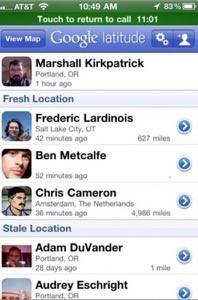Almost two years after announcing Latitude, Google’s entry into the location sharing market, Apple and Google have finally come together to offer an official native Latitude app on the iPhone. And it’s a real let-down.

Location technology is incredibly hot right now, innovation is happening fast and furious, the sky’s the limit, but the Latitude app is a clumsy and severely limited piece of software that’s only likely to appeal to unsophisticated customers who don’t know any better. (Update: A commenter rightly told me this is an arrogant and inappropriate choice of words. I apologize.) It represents the latest missed opportunity by Google and just more fuel for the fire for critics who assert that it “doesn’t get social technology.”
For readers unfamiliar, Latitude is an app that tracks your phone’s location in the background and allows you to make that visible to approved contacts. It’s a very simple app and is very different from more familiar location services like Facebook Places, Foursquare and Gowalla, which focus on “places” (Jim Bob’s Tofu Palace) more than on location (the corner of 60th and Killingsworth). Those other apps don’t track your location persistently and typically enable sharing with a larger group of people than Latitude users will probably share with.

Unfortunately, Latitude isn’t very good. It’s incredibly simple, something that could be an asset after more than two years of development if what it did offer worked well. It was made available as an HTML5 mobile web app in 2009, and it wasn’t very good then either.
Sarah Perez discussed the persistent location sharing and privacy here last week, when the native app was first spotted unannounced.
Latitude is so simple and so exclusively set up for small-group sharing that it feels overly constrained and uninteresting.
First,
friend management is rough around the edges.
You have to page through each request sent to you and you can’t view any information about the person who has requested to share locations with you. If Google is absolutely dedicated to building Latitude as a service for sharing locations with no one but close friends and family, perhaps that’s ok. Typically, though, new software projects are advised not to assume they will know how their users will end up using the software. It’s good to be flexible, and Latitude isn’t.
Little things are bothersome, too: when you deny a request to follow you, for example, the interface says “sending friend request!” That’s a little disconcerting. If you want to see good friend management in location sharing apps, check out how Gowalla does it. That’s pretty good. Better yet, see how Twitter does it.
Second, Latitude says you have granular controls over location sharing, but that’s not really true. By default, you show approved friends your exact location. You can go into settings and place yourself someplace else manually, but Latitude says you can show only city-level location. It’s not easy to see how you do that, but if you click through several clicks on a particular contact, you can find a setting that limits that contact to being able to see what city you’re in. You ought to be able to share neighborhood level location, as well.
If I wanted to shoot a targeted missile at my friend I could probably hit him square in the head, but if I want instead to know what he’s doing in that place where he’s at, I’m totally out of luck with Latitude.
You ought to be able to share different degrees of location with different contacts. You ought to be able to share your exact location with a single contact for a period of time, not all or nothing until you change your location. When you place yourself someplace manually, then switch over to exact location sharing, then switch back to manual placement – it ought to assume you want to share your previous manually placed location, not your last exact location. That just feels half-baked.
You can’t view historical locations and you can’t leave a comment on your location. Latitude is so simple and so exclusively set up for small-group sharing that it feels overly constrained and uninteresting.
See also…Why We Check In: The Reasons People Use Location Based Social Networks
Finally,
Latitude is too much about location and not enough about place.
I can see what street intersection my friend Chris Cameron is at in Amsterdam right now, but I have no idea what kinds of businesses or facilities are in that place. Is he at the grocery store? Is he at a bar? Is he at a plant nursery? If I wanted to shoot a targeted missile at him I could probably hit him square in the head, but since I want to know what he’s doing in that place, I’m totally out of luck.
Is he moving? How long has he been where he’s at right now? What’s nearby his current location? What’s going on? I have no idea.
Why on earth is Latitude not integrated with Google Places? Why not leverage Wikipedia and Google MyMaps like Google Earth does, so I can learn something about the place I’m at. Maybe it will be some day.
In the mean time, I’m not going to use Latitude, I’m going to keep using what I do today for location. I’ll use Glympse when I want to share my location with a select group of people, I’ll use Foursquare when I want to post the places I’m at and tips about those places and I’ll use Gowalla when I want to see where all my friends across Facebook, Foursquare and Gowalla are at.
Is that too complicated for most people? Probably not – but even if it were, the inflexible and extreme simplicity of Latitude today is no answer to that.

















